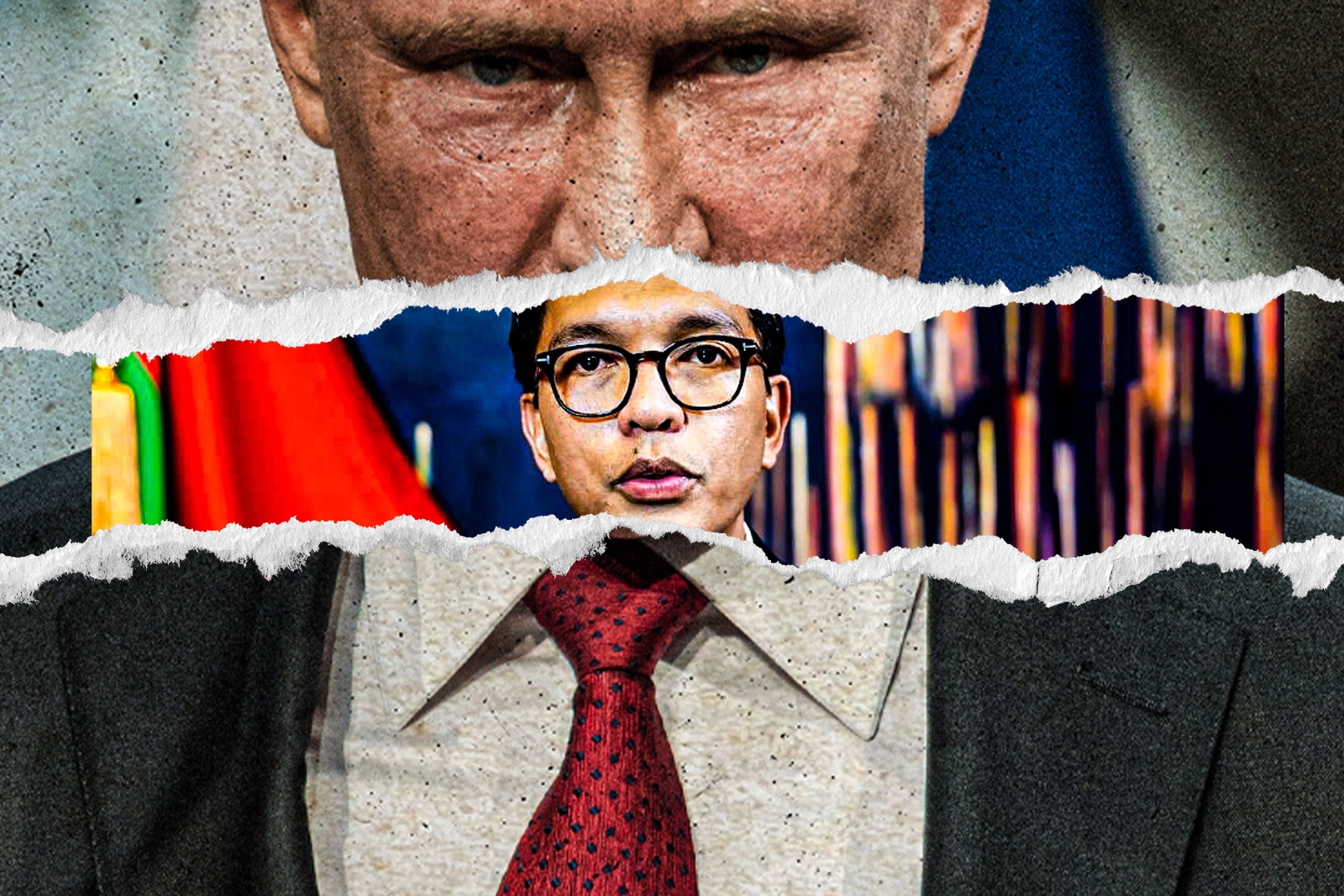
Is Madagascar the Latest Front in the New Cold War with Russia?
As COVID-19 tore through the world in 2020, Andry Rajoelina, the sitting president of Madagascar, referred his citizens to a herbal tonic to ward off the deadly virus. Alexander Lukashenko, the president of Belarus, who also shunned vaccines, prescribed vodka and saunas.
Disproven health remedies aside, little appears to connect these two leaders. But both owe their power to Russian autocrat and war criminal, Vladimir Putin. And, to the detriment of the citizens they serve, both leaders have allowed Moscow to leverage undue influence in their homelands to maintain their power.
Putin conspicuously sent troops to put down protests against “Europe’s last dictator” in 2020, propping up ailing rule in Belarus that has lasted nearly thirty years. The Russian leader also covertly sent his opaque private military company – the Wagner Group – to Madagascar, not to fight the inconveniences of democracy but to manipulate the Malagasy people and insert his chosen man.
For both countries, there would be a price to pay. But where companies rushed to leave Belarus on their own accord following sanctions imposed for assisting Putin’s war in Ukraine, Western companies are now being pushed out of Madagascar by a president with bills to pay.
Rajoelina’s fealty began during the 2019 election year, as the former DJ turned media mogul struggled in the polls. Enter the Wagner boys. A familiar playbook was trotted out: Troll farms and bots, briefcases full of cash for candidates, and fake protests outside of Western embassies. Out of nowhere, Rajoelina secured a resounding win.
But it is not altruism that drives Russia’s campaigns. Every country Moscow “aids” is resource-rich. In a pattern repeated across Africa, Putin grooms unstable and corrupt states, then unleashes his ill-trained mercenaries. Largely recruited from criminals, they commit a litany of human rights abuses and facilitate chaos rather than bringing peace. Perpetual instability breeds further dependence on the Wagner Group for their survival. Russia subsequently seeks payment in concessions for natural resource contracts, or in strategic assets, such as military bases or ports.
Unless the West engages more in some of the continent’s more contentious politics, it leaves an open door to Russia – whose mercenaries have operated in at least a dozen of its nations. This vast, international network creates a flow of resources to Russia that dilutes Western sanctions. It also provides Moscow with diplomatic heft at the United Nations. Consider that all African countries where Russia is active either abstained or voted to block resolutions against its invasion of Ukraine. And now, it is threatening key strategic Western assets in those same nations.
Madagascar is further down the rabbit hole than most. Companies are already under attack from the government and its Russian backers. Phantom charges are pursued against them through Malagasy courts, rated poorly by Freedom House in judicial independence where “outcomes are frequently predetermined.” These are complemented with manufactured threats to put pressure on the companies to settle.
Last year, authorities arrested two French nationals, Philippe Marc Francois and Paul Maillot Rafanohara, after police claimed to have found an email on Rafanohara’s computer requesting $10 million in return for Rajoelina’s assassination. The true target was Madagascar Oil, a British company. The trumped-up charges claimed Al Njoo, a Singapore businessman and Chairman and CEO of Madagascar Oil, had ordered the hit. An independent investigation, of course, found no such email on any computers. Others pressured for money, shares, and assets include American energy company Symbion Power for a power station and to dispossess a luxury hotel. It is just a matter of time before more are targeted.
A number of these cases have a common thread: a self-proclaimed “entrepreneur and visionary” named Zouzar Bouka coaxes Western companies to the country. Then he uses his political connections and the shady local courts to shake them down. He trumpets his personal relationship with the First Lady of Madagascar and the fact that he is best friends with Minister of Justice Johnny Andriamahefarivo.
There’s perhaps little coincidence he is also a Russian fanboy and associate of “Friends of Russia in Madagascar” – a Russian embassy-sponsored NGO teaching in Malagasy schools and hosting grandiose Russian cultural events for children. Get them while they are young seems to be the name of the Kremlin’s game. Concerns in France over Bouka’s association with the well-being of their interests and assets in Madagascar were clearly sufficient to warrant an article about his activities in a center-right newspaper with links to French intelligence.
Bouka’s closeness to former President Hery Rajaonarimampianina should be another concern to Western diplomats. Rajaonarimampianina – who Bouka proudly shows off by his side in a number of his social media posts – has long been known as a Russian asset, his reelection backed with money and technology from “Putin chef” Yevgeny Prigozhin’s Wagner Group, a sordid arrangement exposed by The New York Times. When Rajaonarimampianina failed to make it through to the second round, his supporters – both the Russians, their resources, and of course Bouka – switched to Andry Rajoelina.
All of this results in jeopardy for Western companies. But it also bodes ill for the country. Asset stripping for the paymasters ultimately leads to a self-perpetuating dependency on Russia: the more companies that leave, or are pushed out, the more they look to Moscow as a partner for no better option. The true beneficiaries lie not in Antananarivo, but in the Kremlin.
This all poses a strategic challenge to the West. Africa is home to some of the fastest-growing economies in the world and is abundant in natural resources. Western sanctions will remain ineffective if Russia can rely on its mercenary diplomacy to deliver cash to its coffers and votes at the United Nations. America seems to have finally woken up to this, with Secretary of State Antony Blinken on a tour of the continent at this very moment – hot on the heels of his Russian counterpart, Sergei Lavrov.
But the West cannot afford to take the lofty posture of the immediate post-Cold War years, where countries had to be sufficiently democratic before they would engage with them. Instead, thorough, long-term policy and relationship-building must begin now. Otherwise, nations across the continent will simply turn to other partners. As Africa re-evaluates its place on the world stage, it is time for the West to renew its commitment to the continent.

